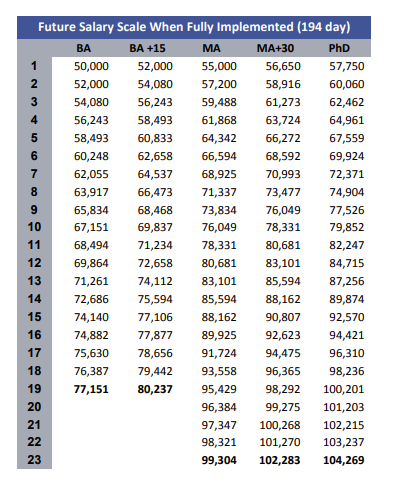TEACHERS’ ROLE EVOLVES: DOES PAY GROW WITH IT?
Photo courtesy of nytimes.com
Teachers protest for better pay in Chicago
At the end of October, Chicago streets exploded with protesting students and teachers. Their walk-out lasted 11 days and concluded with the mayor promising amenities such as smaller classes and a salary increase of 16% over the next five years.
Chicago is the first teacher strike this school year, but it’s also the 10th in 2019. Last school year, Virginia teachers have also had a one day walk out that resulted in a five percent salary raise. But did it help FCPS, which has some of the best salaries, but also some of the worst living costs?
According to indeed.com, in 2018, the average FCPS salary was $62,085, with an average starting salary of $48,074. Meanwhile, according to nea.org, the national average teacher salary in 2018 was $60,477, with a national average starting salary of $39,248.
But what do Westfield High School teachers have to say about their lives and salaries, and what kind of improvement they would like to see?
Lon Pringle, social studies teacher, who has been teaching for 23 years, explains how his opinion on teacher salaries changed over time: “When I first became a teacher, I was thrilled to be making what I thought at the time was a lot of money. I was excited about a job that has health benefits, a pension, and a level of job security. And it changed over time.” The change came, Pringle explains, with the emergence of new responsibilities. “And in my personal view, if you are going to be expected to do more, you should be fairly compensated for that. And I don’t necessarily think that that happened.”
Pringle argues that teaching nowadays is much more than the “dissemination of information” and that schools nationally “have taken on the duties and responsibilities of raising American children, of doing things and teaching young people about much more than just our[their] subject matters.”
Elaine Florimonte, art teacher, concurs that teacher responsibilities are growing, noting that “besides several committees and team meetings, it seems like there is a new procedure every month for different security drills that we do.”
Linus Downes, social studies teacher, agrees: “In these days, compared to years ago, teachers not only instruct, but they act as informal counselors, cheerleaders, and in some cases parents. The only way to attract high quality individuals in my opinion is to raise compensation, meaning salary, pension, other benefits for teachers.”
Downes also argues that one of the things this year that needs to be improved is that teachers are now having part of their planning periods taken away by so many Collaborative Learning Team(CLT) meetings.
Cortlyn Bristol, science teacher, even goes so far as to say that time is what teachers need more than anything, more so than a better salary, claiming “an increase in money would help a few teachers’ motivation, but time is what would help the most.” She argues that while salary is indeed a problem for teachers, many still make it work.
Andrew Donnelly, science teacher, presents contrasting ways of looking at higher salaries. One is that increasing salary will encourage more people to go into teaching. However, that might lead to people going into teaching for money and not because they are passionate.

Expected 2020 teacher salaries scales, with the degree earned on the top and the work experience in years on the left.
“Now, occasionally people fall into it and are not happy because they don’t get paid well, but then they should get the hell out of here. Yet, we are in a terrible shortage of teachers nationwide. So, increasing salaries would help with that,” he explained.
As reported by the Economic Policy Institute (EPI), the teacher shortage was 110,000 in 2018, and could reach 200,000 by 2025.
Like many other teachers, Downes claims that a big problem, specifically in Northern Virginia, is that teacher salaries are not proportionate to the cost of living:“I think the mindset of the community must change. Too many in the community feel we are paid too much for what they think is a mere nine months.”
But teachers have to work over the summer or have second or third jobs during the year. Moreover, teacher salaries are for a 194 days of work, not 365.
Donnelly did full time summer jobs for his first 12 years of teaching, “but it was exhausting, so [he] moved to just having a job that [he does] a couple times a week all year long.”
While Donnelly has been teaching for 15 years and was able to save up for a house in Prince William County, young teachers like John Baranowski, social studies teacher, often have to take different routes to secure housing.
“I have a roommate. We pay fifty-fifty on the rent. Otherwise, I would have to get a second job,” notes Baranowski.
“The fact that they are building townhomes right down the road, starting at $800,000! Not even a house, a townhouse!” exclaimed Baranowski, “That’s absurd. I don’t know how anyone actually works here.”
Baranowski, when asked about teaching, states it’s not too hard, but “there is a learning curve. Like everything in life—if it’s all that easy then it wouldn’t be worth doing.”
Donnelly, on the other hand, states that his job got harder because “at the beginning I did a lot of coasting,” recalled Donelly, “I would spend a reasonable portion of my planning period playing Warcraft. I had free time and the last few years as I’ve taken on more responsibilities, and have become more integrated into managing this place, there is just more to do. Like helping write curriculum, helping fellow teachers, doing more stuff around the school. It’s funny, you would think ‘Ah, he got it all figured out, he doesn’t have to do anything,’ but not if you’re a good teacher, right?”
Education Week, a news organization, reported that 44 percent of new teachers leave teaching within five years, “because it does ask a lot,” explains Donnelly.
“The only thing I can say after years of doing this is it’s important to support [beginning teachers], to help them.”
When Donnelly was a young teacher, he had to switch schools to find a supportive environment. Now, he is the one trying to help, explaining that “you want them to know that yes, this is hard, yes, [students] might treat you badly sometimes, yes, [students] might not always say thank you, but every once in a while they do, and it’s great.”
Katherine Pierce, music teacher, provides a helpful analogy, that helping teachers will help students: “It’s like on an airplane, if you are seated next to a child, put a mask on yourself before you put a mask on the child. You have to take care of yourself in order to take care of other people.”





